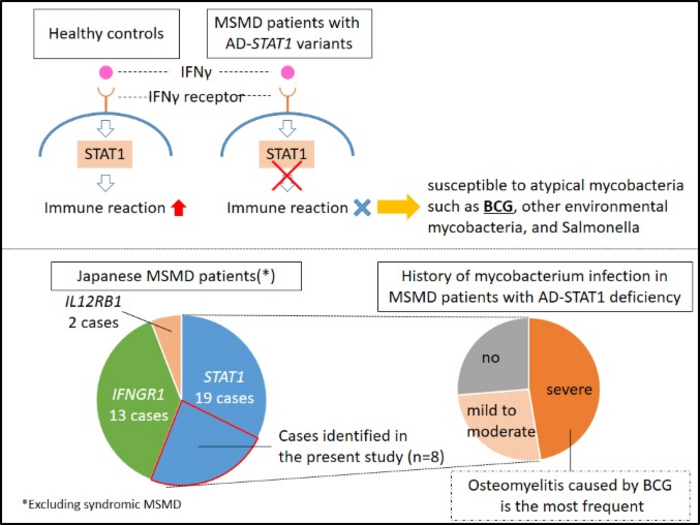Researchers from Tokyo Medical and Dental University (TMDU) find three novel variants in STAT1 that cause Mendelian susceptibility to mycobacterial disease

Credit: Department of Child Health and Development, TMDU
Researchers from Tokyo Medical and Dental University (TMDU) find three novel variants in STAT1 that cause Mendelian susceptibility to mycobacterial disease
Tokyo, Japan – Usually, the scariest part of childhood vaccination, for both kids and parents, is the needles. In rare cases, however, vaccines can have unexpectedly negative effects, and the secret lies in our genes.
In a study published recently in the Journal of Clinical Immunology, researchers from Tokyo Medical and Dental University (TMDU) have revealed three previously unknown variants that can cause a severe reaction to a normal childhood vaccine.
In countries where tuberculosis is common, children often receive the bacillus Calmette-Guérin (BCG) vaccine to protect them from getting infected. Some cases, however, show an unexpectedly negative reaction to the BCG vaccine, due to a condition known as Mendelian susceptibility to mycobacterial disease (MSMD). The BCG vaccine in children with MSMD can cause swollen lymph nodes, inflamed bone tissue, and abscesses.
“Adverse reactions to the BCG vaccine are known to be associated with inherited variants in genes involved in the immune response,” says lead author of the study, Rintaro Ono. “Thus, when we encountered four pediatric patients who exhibited signs of mycobacterial disease after BCG vaccination, we analyzed their genome to determine what mutations were responsible for this reaction.”
To do this, the research team collected blood samples from the children and their immediate relatives and sequenced their genomic DNA to identify variants in genes related to immunity. They then tested the effects of the identified variants in the lab to determine the functional consequences of the variants.
“The results were somewhat unexpected,” explains Hirokazu Kanegane, senior author. “While the variants that we found were in a gene called STAT1, which is often mutated in patients with MSMD, three out of the four variants that we identified have never been seen before.”
Functional analysis of these three new variants demonstrated that they resulted in loss of function of the STAT1 protein, which made it unable to activate an appropriate immune response to the vaccine. Importantly, the variants show dominant negative, which means that the products of these mutated genes prevent the products of the wild-type gene (also known as natural form) from carrying out their normal activities—all in the same cell.
These findings suggest that heterozygous dominant negative variants in STAT1 may be a common cause of MSMD in Japanese patients. Given that the initial symptoms of MSMD (such as fever) are common in children, but can be severe or prolonged in patients with MSMD, it is important to monitor these patients closely after BCG vaccination. Careful follow-up and evaluation for STAT1 variants, such as those identified in this study, may enable these patients to be diagnosed and treated earlier.
###
The article, “Novel STAT1 variants in Japanese patients with isolated Mendelian susceptibility to mycobacterial diseases,” was published in the Journal of Clinical Immunology at DOI: 10.1007/s10875-022-01396-1.
Journal
Journal of Clinical Immunology
DOI
10.1007/s10875-022-01396-1
Article Title
Novel STAT1 Variants in Japanese Patients with Isolated Mendelian Susceptibility to Mycobacterial Diseases




